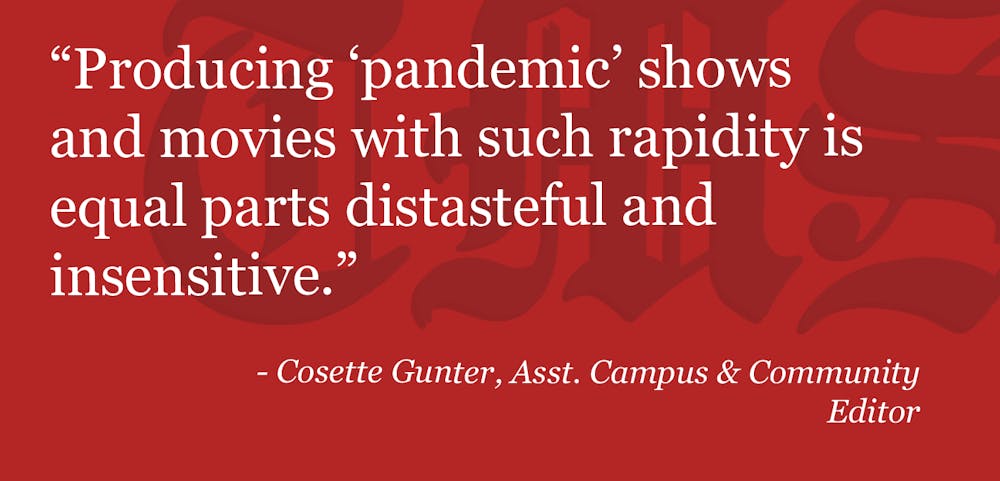During a time when nearly one in five Americans and three in 10 Black or Hispanic Americans report knowing a close friend or relative that has died from COVID-19, it’s safe to say there’s been some trauma acquired over the course of the pandemic.
However, despite the obvious mental, emotional and physical hardship that Americans, as well as the rest of the world, have been and are still experiencing, production studios are already churning out shows and movies that revolve around life in the time of COVID-19.
Shows like Netflix’s “Social Distance” and Freeform’s “Love in the Time of Corona” were written specifically to center around life in quarantine. Both shows feature different, seemingly middle-class characters who struggle in quarantine with anything from resisting texting exes to feeling disconnected from family and friends.
Though these are real experiences, the shows represent a privileged lens of the pandemic experience. While some Americans waited in long lines at food donation centers, others never went to bed with the fear of what they would eat the next day. Not every American had a pool in their backyard to enjoy, or had stable internet access to work from home, like many of the portrayed characters did.
Other pre-COVID shows like “black-ish” have already written COVID-19 into its scripts, and many others plan to incorporate the pandemic into future episodes, just a year after America went into lockdown.
Even worse, movies like “Songbird” and “The Second Wave” capitalize on and dramatize situations too close to the reality that Americans have faced in the last year; not to mention there are other strains of the coronavirus that present real threats of second waves.
Granted, for shows like “Grey’s Anatomy” and “The Good Doctor,” it might be too outside of the realm of reality to exclude every mention of the coronavirus and the pandemic, but timing is everything. We’re not even out of the pandemic and soon our methods of escape will widely reflect the very thing we’re trying to get away from — accurate portrayal or not.
Now, sure, the pandemic was bound to find its way into Hollywood, and at some point it will be important to include such a pivotal point in history, but the reality is that this moment in time is not over yet, and the time to do that is not now.
There is still grief, there is still widespread financial insecurity, people are still being evicted, recovered patients are still coping with long-term side effects and the last thing these people want to see when they turn on the TV or log onto Netflix is something that reminds them of the world they have to return to again tomorrow.
Producing ‘pandemic’ shows and movies with such rapidity is equal parts distasteful and insensitive. It showcases a lack of connection to the exhausting experience of the last year- something that can’t already be summarized, fictionalized or illustrated effectively yet.
As Ryan Murphy, writer of “American Horror Story”, said in an interview with The Hollywood Reporter, “I’m personally more interested in things that are about hope, beauty and romance — the opposite of the darkness that we’re going through.”
There will be a time when the pandemic is something to be looked back upon, but for an event that continues to be so widely devastating, writers should put themselves in the shoes of those who are continually stricken by loss and destitution. These stories can only be told after time has begun to heal and provide perspective; otherwise, it’s just taking away another safe space people desperately need.




